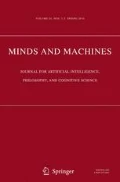Abstract
It will be found that the great majority, given the premiss that thought is not distinct from corporeal motion, take a much more rational line and maintain that thought is the same in the brutes as in us, since they observe all sorts of corporeal motions in them, just as in us. And they will add that “the difference, which is merely one of degree, does not imply any essential difference”; from this they will be quite justified in concluding that, although there may be a smaller degree of reason in the beasts than there is in us, the beasts possess minds which are of exactly the same type as ours. (Descartes 1642: 288–289.)
References
Bayle, Pierre (1697), ‘Rorarius’, in Bayle'sHistorical and Critical Dictionary, trans. R. H. Popkin, Indianapolis: Hackett Publishing Co. (1991), pp. 213–254.
Descartes, René (1628),Rules for the Direction of the Mind, trans. in J. Cottingham, R. Stoothoff, and D. Murdoch,The Philosophical Writings of Descartes, Vol. 1, Cambridge, UK: Cambridge University Press (1985), pp. 7–78.
Descartes, René (1637),Discourse on Method, trans. in J. Cottingham, R. Stoothoff, and D. Murdoch,The Philosophical Writings of Descartes, Vol. 1, Cambridge, UK: Cambridge University Press (1985), pp. 109–151.
Descartes, René (1642a),Mediations on First Philosophy, trans. in J. Cottingham, R. Stoothoff, and D. Murdoch,The Philosophical Writings of Descartes, Vol. 2, Cambridge, UK: Cambridge University Press (1984), pp. 1–62.
Descartes, René (1642b),Objections and Replies, trans. in J. Cottingham, R. Stoothoff, and D. Murdoch,The Philosophical Writings of Descartes, Vol. 2, Cambridge, UK: Cambridge University Press (1984), pp. 1–62.
Descartes, René (1642b),Objections and Replies, trans. in J. Cottingham, R. Stoothoff, and D. Murdoch,The Philosophical Writings of Descartes, Vol. 2, Cambridge, UK: Cambridge University Press (1984), pp. 93–383.
Dretske, Fred (1985), ‘Machines and the Mental’,Proceedings and Addresses of the American Philosophical Association 59, pp. 23–33.
Grice, Paul (1978), ‘Further Notes on Logic and Conservation’,Syntax and Semantics: Pragmatics, Vol. 3, ed. Peter Cole, New York: Academic Press, pp. 113–127.
Harnad, Stevan (1991), ‘Other Bodies, Other Minds: A Machine Incarnation of an Old Philosophical Problem’,Minds and Machines 1, pp. 43–54.
Hauser, Larry (1993), ‘Why Isn't My Pocket Calculator a Thinking Thing?’Minds and Machines 3, pp. 3–10 (this issue).
Hauser, Larry (1992), ‘Acting, Intending, and Artificial Intelligence’, paper presented at the Colloquium on Action Theory, American Philosophical Association Central Division, Louisville, KY (25 April 1992); abstract,Proceedings and Addresses of the American Philosophical Association, Vol. 65, No. 6 (February), p. 75.
Hauser, Larry (forthcoming-a), ‘Act, Aim, and Unscientific Explanation’,Philosophical Investigations.
Hauser, Larry (forthcoming-b), ‘Reaping the Whirlwind: Reply to Stevan Harnad's “Other Bodies, Other Minds”’,Minds and Machines.
Kripke, Saul (1977), ‘Speaker's Reference and Semantic Reference’, in P.A. French, T.E. Uehling, Jr., and H. K. Wettstein (eds.),Midwest Studies in Philosophy, Vol. 2, Morris, MN: University of Minnesota, pp. 255–276.
Nagel, Thomas (1974), ‘What Is It Like to Be a Bat?’,Philosophical Review 83, pp. 435–450.
Nagel, Thomas (1986),The View from Nowhere, New York: Oxford University Press.
Putnam, Hilary (1975), ‘The Meaning of “Meaning”’, in H. Putnam,Mind, Language, and Reality: Philosophical Papers, Vol. 2, Cambridge, UK: Cambridge University Press, pp. 215–227; first published inLanguage, Mind, and Knowledge: Minessota Studies in the Philosophy of Science, VII, Minneapolis, MN: University of Minnesota Press (1975).
Rapaport, William J. (1993), ‘Because Mere Calculation Isn't Thinking: Comments on Hauser's “Why Isn't My Pocket Calculator a Thinking Thing?”’,Minds and Machines 3, 11–20 (this issue).
Ryle, Gilbert (1949),The Concept of Mind, New York: Barnes & Noble.
Searle, John R. (1975), ‘Indirect Speech Acts’, in J. Searle (ed.),Expression and Meaning, Cambridge, UK: Cambridge University Press (1979), pp. 30–57.
Searle, John R. (1980a), ‘Minds, Brains, and Programs’,Behavioral and Brain Sciences 3, pp. 417–424.
Searle, John R. (1980b), ‘Intrinsic Intentionality’,Behavioral and Brain Sciences 3, pp. 450–457.
Searle, John R. (1989), ‘Consciousness, Unconsciousness, and Intentionality’,Philosophical Topics XVII (1), pp. 193–209.
Searle, John R. (1990a), ‘Consciousness, Explanatory Inversion, and Cognitive Science’,Behavioral and Brain Sciences 13, pp. 585–596.
Searle, John R. (1990b), ‘Who Is Computing with the Brain?’,Behavioral and Brain Sciences 13, pp. 632–640.
Searle, John R. (1990c), ‘Is the Brain's Mind a Computer Program?’,Scientific American, Vol. 262, No. 1 (January), pp. 26–31.
Turing, Alan M. (1950), ‘Computing Machinery and Intelligence’,Mind 59, pp. 436–460; reprinted in M.A. Boden (ed.),The Philosophy of Artificial Intelligence, Oxford, UK: Oxford University Press (1990); page references are to Boden.
Watson, John B. (1913), ‘Psychology as the Behaviorist Views It’,Psychological Review 20, pp. 158–177.
Wittgenstein, Ludwig (1958),Philosophical Investigations, trans. G. E. M. Anscombe, Oxford, UK: Basil Blackwell.
Ziff, Paul (1960),Semantic Analysis, Ithaca, NY: Cornell University Press.
Rights and permissions
About this article
Cite this article
Hauser, L. The sense of ‘thinking’. Mind Mach 3, 21–29 (1993). https://doi.org/10.1007/BF00974303
Issue Date:
DOI: https://doi.org/10.1007/BF00974303

